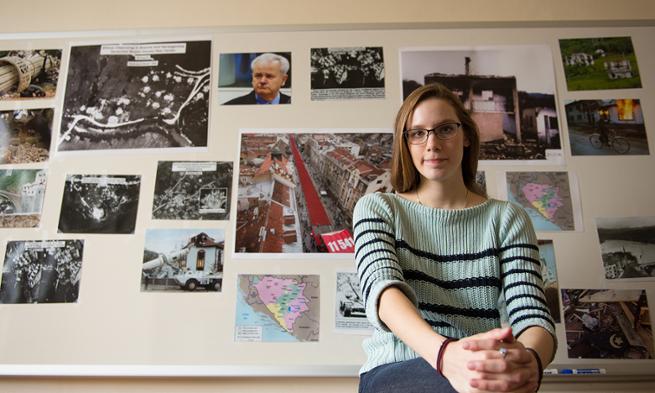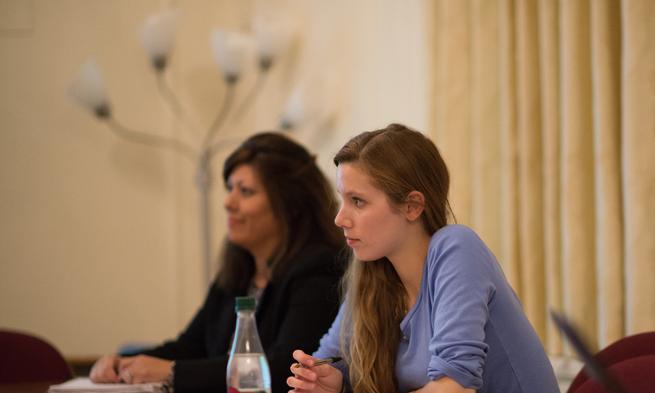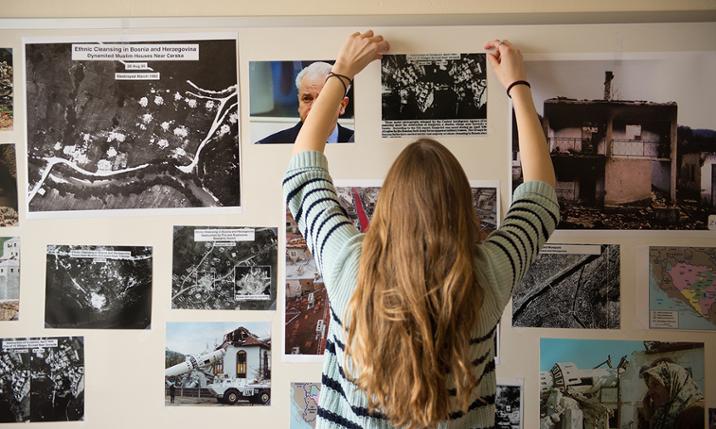Interdisciplinary focus on peace
Nation and World
SUMMARY: Emily Spiwak's ('14) research on intelligence and presidential policymaking during the 1990s Bosnian War demonstrated the need for a collaborative approach to solving the problems of war and peace.
Researching war convinces senior Emily Spiwak of the need for a multifaceted approach to peace efforts

Emily Spiwak ('14), an international affairs and interdisciplinary religion major with a concentration on the Middle East, is an intern at the Center for Interdisciplinary Study for Terrorism and Peace at JMU.
"We need people in multiple fields to work together focusing on issues such as this. Taking a purely political standpoint or a purely religious standpoint won't get us anywhere; we need to work together." — Emily Spiwak
In preparation for the Intelligence and the Transition from War to Peace Conference held at JMU in March, Spiwak and other JMU students analyzed recently declassified CIA documents on intelligence and presidential policymaking during the 1990s Bosnian War that were the basis for the conference scholarship. She analyzed the documents looking for evidence of the deliberate targeting of religious structures and religiously dominated neighborhoods by various factions during the Bosnian conflict. "The CIA documents contain images of towns and cities with mixed populations of Muslims and Serbs or Croats. You can see instances of blatant targeting where only the Muslim houses and mosques were destroyed or only the Croat-Catholic church was destroyed. These images provide tangible evidence of genocide," she says.
Her research "Destroying Buildings, Destroying Culture" demonstrated that that culturally significant architecture with its unique ability to reinforce national identity was frequently targeted during the Bosnian War in efforts to erase a certain ethnic group from neighborhoods and territories.

"While the progression of violence toward the Muslim population in Bosnia is easy to track, what is more difficult to understand is why neighbors who had lived side-by-side would descend to the level of genocide," says Spiwak. "Some people have blamed it on World War II atrocities, others cite Serbian President Milosevic's propagation of nationalism; still others believe the ancient Battle of Kosovo between the Serbian nation and the Ottoman Empire formed the basis for the eruption of hostilities in the 1990s."
Spiwak's research has brought her face-to-face with the grim aftereffects of the Bosnian conflict—centuries-old landmarks had disappeared; cultural memory was lost. Yet she retains a sense of optimism for the future, noting that the Center for the Interdisciplinary Study of Terrorism and Peace does not focus simply on violence and intimidation. "We're striving for peace. I really hope that looking at the Bosnian conflict moves us as a global society to reject genocide and ethnic cleansing as unacceptable," Spiwak says.
